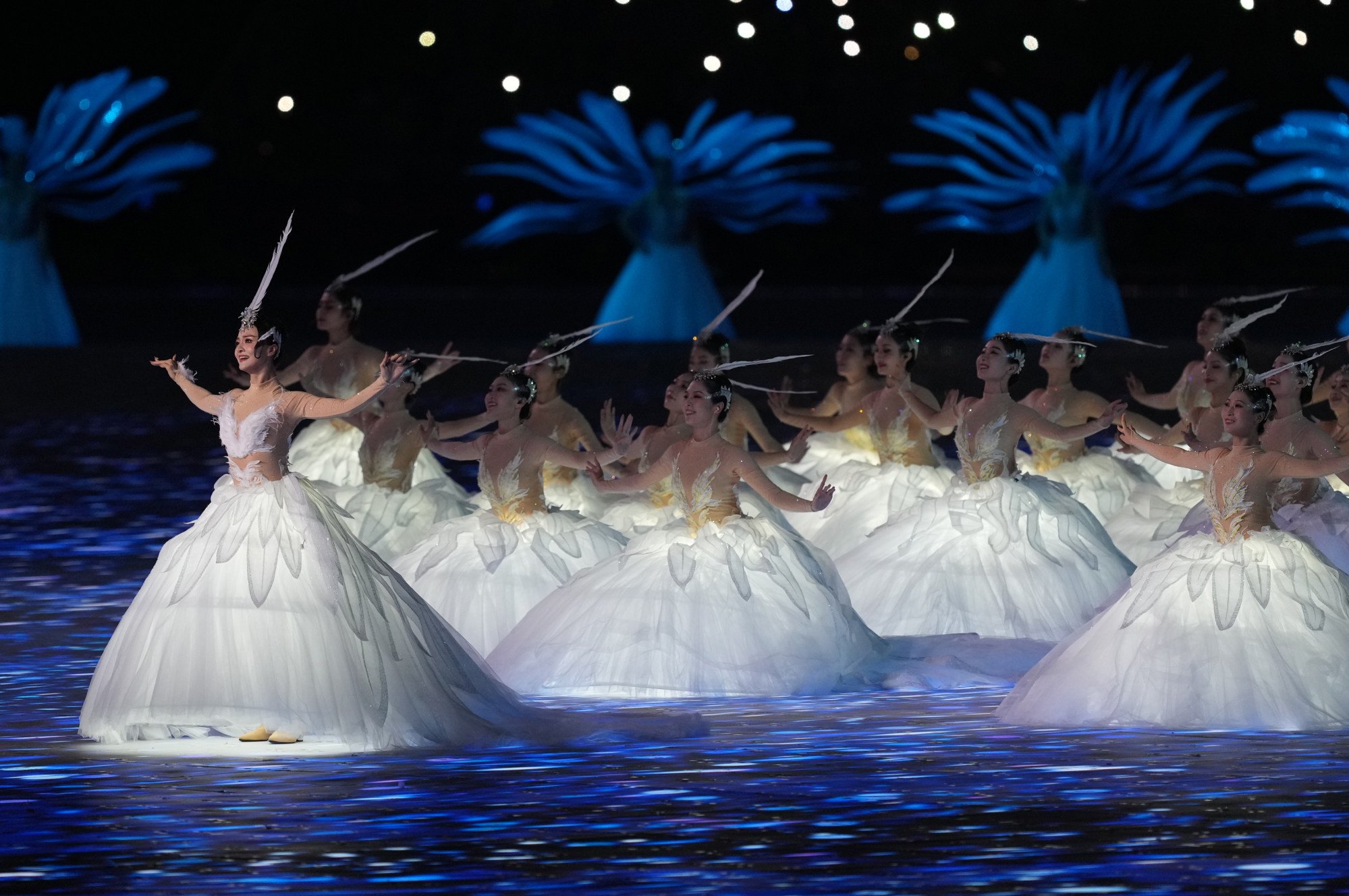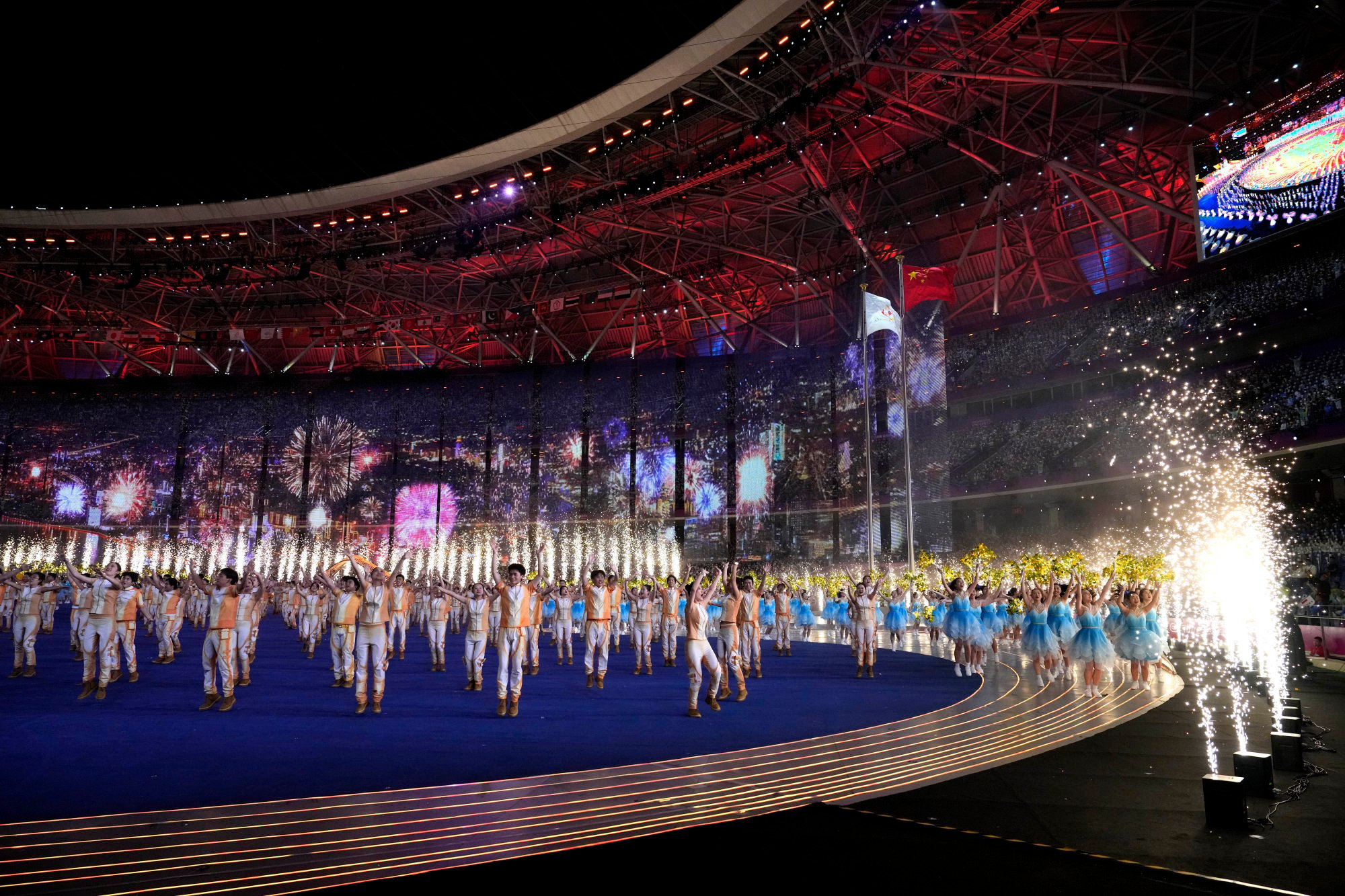
Xi Jinping opens China-hosted Asian Games as colourful ceremony in Hangzhou tells of ‘tide rising from Asia’
- Technology and ecological protection are central themes of extravaganza at Hangzhou Olympic Sports Centre Stadium, watched by Xi and visiting counterparts
- Ceremony marks the official start of the Games, featuring almost 12,000 athletes, 45 countries and territories, and 40 sports
Chinese President Xi Jinping opened the delayed 2022 Asian Games in Hangzhou on Saturday night amid a blaze of artistry and technology, befitting an event hailed as the biggest, greenest and most innovative of its kind.
The 80,000 spectators packed into Hangzhou Olympic Sports Centre Stadium let out a huge roar when Xi entered and sat next to visiting dignitaries, including Syrian President Bashar al-Assad, with whom he had held meetings earlier in the day.
On several levels, the Games – which had been delayed by Covid-19 – will be China’s biggest sporting event in more than a decade, with almost 12,000 athletes from 45 countries and territories competing across 40 sports.
Drawing inspiration from everything from ancient Chinese culture to the seemingly boundless advances made in the unofficial home of the country’s tech industry, the opening ceremony’s theme of “tide rising from Asia” was played out against a backdrop of a message of unity across the region.

Xi left the speeches to others, simply declaring the largest Games in history open, having done his talking earlier in the day.
At a welcome banquet for foreign dignitaries, Xi called for promoting peace, solidarity and inclusiveness through sports, a day after he vowed to work with the International Olympic Committee on upholding the principle of the “non-politicisation of sports” in a meeting with IOC chief Thomas Bach.
Describing those in attendance as members of a community with a shared future, Xi said Asian countries should adhere to good neighbourliness and mutual benefit, reject a cold-war mentality and camp-based confrontation, and make Asia “an anchor for world peace”.
Among the other region’s leaders in Hangzhou for the start of the Games were Cambodia’s King Norodom Sihamoni, South Korea’s Prime Minister Han Duck-soo, Princess Sirivannavari of Thailand and Hong Kong’s Chief Executive John Lee Ka-chiu.
How to watch the Asian Games in Hong Kong
“You have got Xi Jinping attending the opening ceremony and this is being pushed by state media as a sort of diplomatic friendship-building initiative with China taking centre stage,” Mark Dreyer, author of Sporting Superpower, a book about China’s sporting ambitions, said.
“If nothing else, the Games will be a distraction from [economic woes] because China will do very well. Is that going to make up for the day-to-day pain that people may or may not be experiencing? Probably not, but I don’t think it will hurt.”
This, though, was not a night for overt politics, but one for marvelling at the manner in which technology was blended into the performance: the digital torch-bearer that raced around the stadium to simultaneously spark a virtual cauldron, while the physical one was also coming alight, may have been the most impressive part of the evening.
It did not draw the loudest cheer, which was saved for the arrival of the Chinese delegation, although the thunderous applause that greeted the Hong Kong team ran it close.
Raja Randhir Singh, acting president of the Olympic Council of Asia (OCA), hailed the efforts of the local organisers when his turn came.
“You have done a fantastic job in preparing for the Asian Games,” he said.
“The one-year postponement due to the pandemic was unprecedented in OCA history, but your diligence and determination will bear fruit over the next 16 days and you will be rewarded with the most magnificent and successful Asian Games ever.”
It is also likely to prove the greenest, with the use of zero-carbon methanol to fuel the torch just one example of the steps being taken to make it the first truly carbon-neutral multi-sport event.
Mental ability may decide Asian Games medals – just ask Olympic champ Cheung
Bach, who also attended the ceremony, praised Hangzhou for setting an example for future hosts of Asian and Olympic Games.
Sha Xiaola, the man responsible for the evening’s entertainment, said the desire to be green had been reflected in a show which highlighted Hangzhou’s “achievements in ecological protection”.
Nature played a significant part, with water at the heart of the ceremony and the opening piece, Water in Autumn Glow, reflecting “a means by which we welcome the incoming guests, creating a warm atmosphere”.
Sha said the tide was “China in the new era blending with Asia and the world”.
Not that you would necessarily know it from the celebratory mood inside the stadium, but the environment in China is different to previous years, when the economy was booming and public sentiment more upbeat.

Organisers have already spent about 10.2 billion yuan (US$1.4 billion) on venues for competitions and training, and in 2021 officials said the city had invested 224.8 billion yuan in infrastructure, including venues for the event, between 2016 and 2020.
With a changed economic landscape, Xu Bin, deputy director of the event’s publicity department, said the plan was for a frugal games and officials would be “as thrifty as possible”.
Of the 56 venues being used over the next two weeks, all but two have been confirmed for commercial use after the Games, while the village housing some 200,000 athletes, media and other officials will become fully residential afterwards.
While the Games could help generate an estimated 414.1 billion yuan of gross domestic product during the period, observers suggested the perception that China was “open for business” was just as important, as was the message from the opening ceremony of “unity and strength in Asia”.


